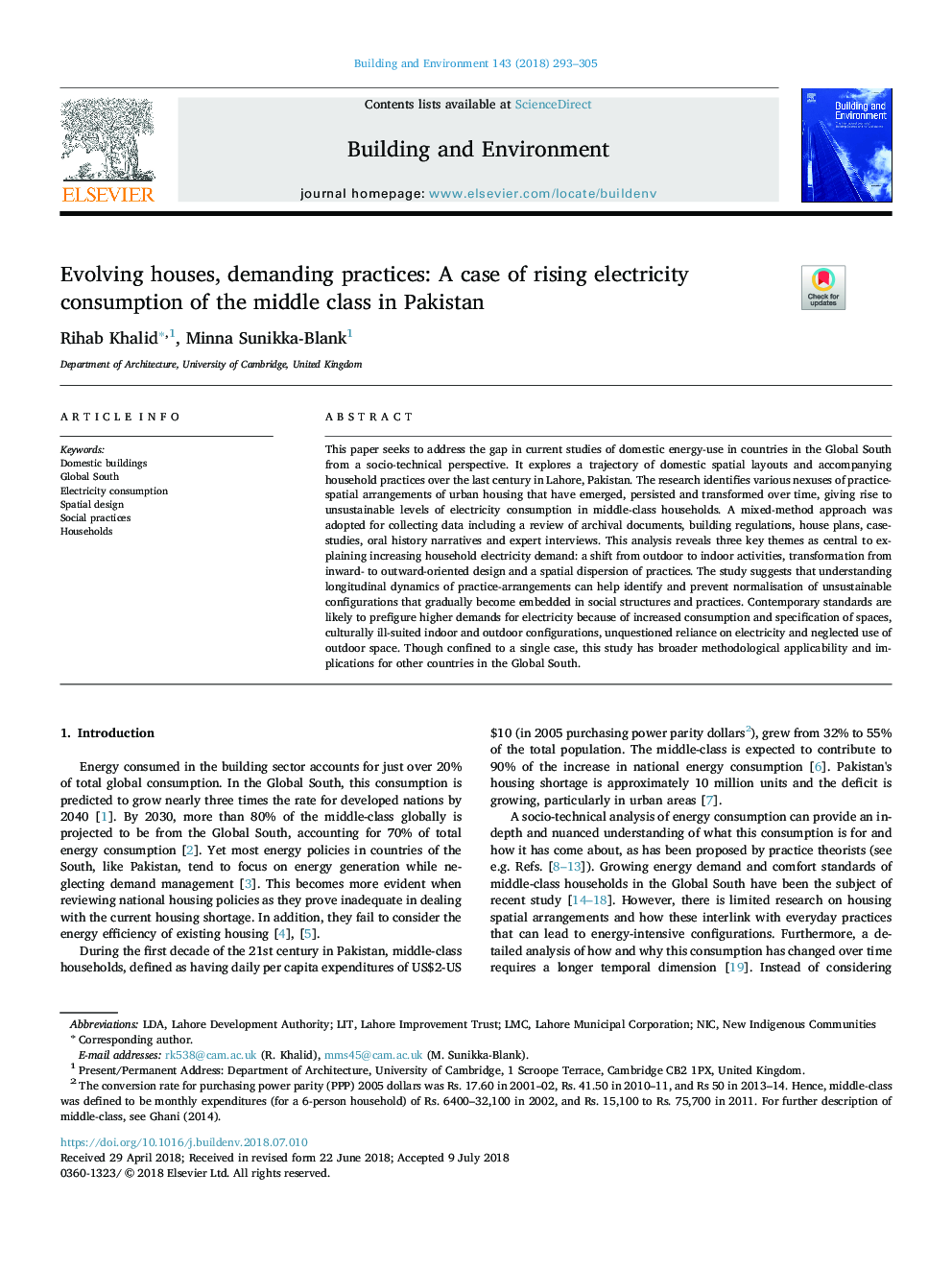| کد مقاله | کد نشریه | سال انتشار | مقاله انگلیسی | نسخه تمام متن |
|---|---|---|---|---|
| 6696556 | 1428349 | 2018 | 13 صفحه PDF | دانلود رایگان |
عنوان انگلیسی مقاله ISI
Evolving houses, demanding practices: A case of rising electricity consumption of the middle class in Pakistan
ترجمه فارسی عنوان
خانه های تکامل یافته، خواستار شیوه: مورد افزایش مصرف برق طبقه متوسط در پاکستان
دانلود مقاله + سفارش ترجمه
دانلود مقاله ISI انگلیسی
رایگان برای ایرانیان
کلمات کلیدی
ترجمه چکیده
این مقاله به دنبال شکاف در مطالعات فعلی در زمینه استفاده از انرژی داخلی در کشورهای جنوب غربی از منظر اجتماعی و فنی است. این مطالعه مسیری از طرح های فضایی داخلی و همراهی با شیوه های خانگی را در قرن گذشته در لاهور پاکستان بررسی می کند. این تحقیق ارتباطات مختلفی را در زمینه مکانیزمهای عملیاتی مسکن شهری که در طول زمان ظهور، اصرار و تغییر کرده است، ایجاد می کند و موجب افزایش میزان مصرف برق در خانواده های طبقه متوسط می شود. برای جمع آوری داده ها از جمله بررسی اسناد بایگانی، مقررات ساختمان، طرح های خانه، مطالعات موردی، روایت های تاریخ شفاهی و مصاحبه های متخصص، یک رویکرد ترکیبی به کار گرفته شد. این تجزیه و تحلیل نشان می دهد سه موضوع کلیدی به عنوان مرکزی برای توضیح افزایش تقاضای برق خانوار: تغییر از فعالیت های در فضای باز به داخل، تبدیل از طراحی داخلی به طراحی بیرونی و یک پراکندگی فضایی شیوه. این مطالعه نشان می دهد که شناخت دینامیکی طولی ترتیب اقدامات می تواند به شناسایی و جلوگیری از نرمال سازی تنظیمات غیر قابل تحمل کمک کند که به تدریج در ساختارها و شیوه های اجتماعی جاسازی شود. استانداردهای معاصر به دلیل افزایش مصرف و مشخص کردن فضاها، پیکربندی های داخلی و خارجی در محیط های نامناسب، اعتماد بدون شک به برق و استفاده نادیده گرفته شده از فضای باز، احتمالا پیش نیازهای بیشتری را برای برق ایجاد می کنند. اگر چه محدود به یک مورد تنها، این مطالعه کاربرد گسترده روش شناختی و پیامدهای دیگر برای کشورهای دیگر در جنوب جهانی است.
موضوعات مرتبط
مهندسی و علوم پایه
مهندسی انرژی
انرژی های تجدید پذیر، توسعه پایدار و محیط زیست
چکیده انگلیسی
This paper seeks to address the gap in current studies of domestic energy-use in countries in the Global South from a socio-technical perspective. It explores a trajectory of domestic spatial layouts and accompanying household practices over the last century in Lahore, Pakistan. The research identifies various nexuses of practice-spatial arrangements of urban housing that have emerged, persisted and transformed over time, giving rise to unsustainable levels of electricity consumption in middle-class households. A mixed-method approach was adopted for collecting data including a review of archival documents, building regulations, house plans, case-studies, oral history narratives and expert interviews. This analysis reveals three key themes as central to explaining increasing household electricity demand: a shift from outdoor to indoor activities, transformation from inward- to outward-oriented design and a spatial dispersion of practices. The study suggests that understanding longitudinal dynamics of practice-arrangements can help identify and prevent normalisation of unsustainable configurations that gradually become embedded in social structures and practices. Contemporary standards are likely to prefigure higher demands for electricity because of increased consumption and specification of spaces, culturally ill-suited indoor and outdoor configurations, unquestioned reliance on electricity and neglected use of outdoor space. Though confined to a single case, this study has broader methodological applicability and implications for other countries in the Global South.
ناشر
Database: Elsevier - ScienceDirect (ساینس دایرکت)
Journal: Building and Environment - Volume 143, 1 October 2018, Pages 293-305
Journal: Building and Environment - Volume 143, 1 October 2018, Pages 293-305
نویسندگان
Rihab Khalid, Minna Sunikka-Blank,
